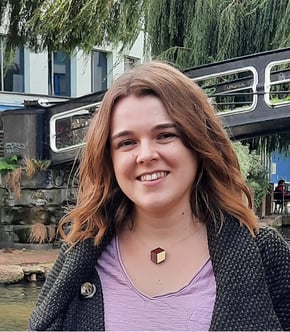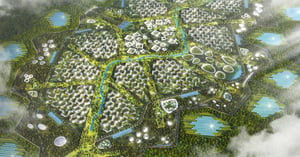When talking about smart cities, the African continent is often neglected. But there are many important developments there that can inspire future cities on other continents. For example, Dubai-based architecture firm Urb has unveiled a new design for a smart, self-sufficing city in South Africa called The Parks.
60% green and open spaces
Africa wants to step up its smart city game. With Cairo, Algiers and Tunis ranked as the continent’s smartest cities, there is much room for improvement in Sub-Saharan Africa. The architecture studio Urb has now presented plans for The Parks, a 17 km²-large sustainable city in the East of South Africa. This smart, self-sufficient city aims to produce 100 per cent of its energy, water, and food on site. The landscape is designed to promote social sustainability and an active lifestyle for around 150,000 people.
Urb is an architecture studio headquartered in the Dubai Design District. It is currently planning several mega-scale smart and sustainable cities, such as Xzero, AlNama and Nexgen. AlNama will be a zero-carbon smart city for 44,000 residents in Riyadh in Saudi Arabia.
But The Parks will be the most sustainable of these new cities. It will consist of 40,000 residential units in 12 districts. Various mixed-use hubs for residential, medical, touristic, entertainment, retail, and education purposes will make up the city. At its centre, a 5 km long multifunctional green spine branching off into community parks will link the buildings together. This resilient landscape with 60% of the city dedicated to green and open spaces will connect the residents to different hubs within the development. It should be possible to reach most parts of the city in minutes by walking, cycling, or using an electric shuttle. Like the 15-Minute-City-Cconcept, read more in our article about. There will also be over 32 km of running, cycling, and equestrian tracks to provide a range of active transport options.
A zero-carbon destination
The Parks will be the world’s smartest and most sustainable city. It will be car-free, emitting zero CO2 and sustaining itself almost completely. Local urban food production will provide 100 per cent of the caloric intake of residents. This also reduces food miles from transport, which often accounts for significant levels of carbon emissions.
By integrating ideas of the Garden City and the 15-minute-city, the city wants to become an international best practice example. The green spine will also serve as a green lung that is resilient to climate change effects, while providing transport options at the same time. Other elements of The Parks will be outdoor fitness stations, community farming plots, outdoor sports courts, waste to art public realm, outdoor concerts, and many sports opportunities.
Even the economy planned for The Parks follows this theme: It will consist of automated and digital work with most jobs focused on green tech. More than 40,000 jobs will be created during the planning, construction, and operation of the city, contributing to the green economic growth of the whole country.
Socially, The Parks also aims for maximum sustainability. The different housing types in each district will cater to all income levels and there will be community gardens for everyone. Thereby, the city hopes to avoid segregation and to enable an inclusive and diverse workforce with flourishing community cohesion.
The first energy-positive city
Currently, no city in the world is anywhere near being self-sufficient. Copenhagen and Zurich as well as Canberra and the archipelago of Tokelau in the Pacific Ocean are well on their way, but still depend on external food, water, and electricity provision. The Parks will produce 100% of its drinking water on-site with solar-powered air-to-water generators. It will also recycle 100% of its water for irrigation and have urban farms and gardens to grow all the food needed by residents. Food security is a priority, which is why The Parks will build climate-controlled indoor vertical farming, beehives with remote surveillance, sustainable poultry and dairy farming, aquaponics, and productive landscapes with a bio saline agriculture.
Waste in the city will become a resource. With a comprehensive zero waste strategy, The Parks aims at minimising waste production supported by community awareness programmes. Waste separation at the source and the collection of all types of waste will help create an efficient waste recycling loop. Shopping outlets will promote the use of zero packing solutions with biodegradable packaging as an alternative solution. Single-use plastics will be banned. 3D construction printing technologies will further help to minimise waste.
Renewable energy will be the primary source of energy in The Parks. In addition, biogas will be produced from organic waste. Cooking oil from restaurants and kitchens will be recycled into Biodiesel and used as fuel in construction. The city will produce a surplus of energy, making it the first energy-positive city in the world. It will provide energy to neighbouring communities.
Living in balance with nature
The master-planned development was guided by ecological approaches. For example, the landscape of The Parks is designed to capture water, which can then be treated and reused. At the same time, the green spaces and the entire city will mitigate flooding and provide important habitats for wildlife in a network of green and blue infrastructure, including wetland-like parks. The green spine will provide an integrated network of biophilic systems, resulting in environmental, social, and economic benefits for residents such as reducing air pollution, promoting biodiversity, increasing social integration, and giving space to urban farming.
📽️ Have a look into the Youtube Video about The Parks (Video Source: URB)
As a resilient city, The Parks will be able to withstand external shocks from climate change effects such as flooding. Its holistic, water-sensitive design includes rainwater gardens, permeable paving and constructed wadis, among other strategies. In summer, the community will benefit from cooling effects to mitigate Urban Heat Islands. Trees and plants are chosen based on their ability to be drought tolerant, provide shade, and create habitat. The green infrastructure will also be part of efforts to raise awareness of sustainability and to live in balance with nature.
A living lab for future smart cities
Like with any new-built city, there are concerns that The Parks will struggle at first to attract residents. The lack of an existing community can challenge the organic growth of urban life, as Masdar City in the UAE shows. Urb hopes for a diverse population and wants to eliminate segregation, one of the biggest challenges in South Africa. By providing mixed zoning and different types of housing in each district, the architects hope to create diverse and cohesive communities.
Cost is another challenge: With a price tag of at least 20 billion USD, The Parks will be one of the world’s most expensive cities. So far, it is not clear how The Parks will be funded. However, the running costs of this smart, sustainable, and self-sufficient city will be much lower than that of other cities due to the use of 100 per cent renewable energy, the water recycling, and the on-site food production. Green tech jobs, ecotourism, medical tourism, and edutainment will be other streams of income for The Parks.
Ultimately, The Parks will become a living lab with a smart grid, using technologies such as Artificial Intelligence for predictive analysis, blockchain technology, and user feedback. Residents will be involved in all aspects of urban planning with the option of becoming community stewards. The designers from Urb want to turn The Parks into a city that takes full advantage of its natural surroundings to showcase how future cities can be healthier, more resilient, more sustainable, and more liveable.
Explore our platform for innovative solutions!
Join our platform today to connect with over 14,000 members from around the world. If you're looking for business opportunities in smart city development, our Tender Premium service makes discovering public tenders a breeze. Customise your search, fine-tune your preferences and receive timely alerts to stay on top of relevant procurement opportunities.


